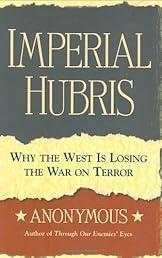
|
Price: $15.21 ( (as of 2012-10-07 02:11:19 PST) You save $12.29 (45%)
(as of 2012-10-07 02:11:19 PST) |
DescriptionThough U.S. leaders try to convince the world of their success in fighting al Qaeda, one anonymous member of the U.S. intelligence community would like to inform the public that we are, in fact, losing the war on terror. Further, until U.S. leaders recognize the errant path they have irresponsibly chosen, he says, our enemies will only grow stronger.According to the author, the greatest danger for Americans confronting the Islamist threat is to believe—at the urging of U.S. leaders—that Muslims attack us for what we are and what we think rather than for what we do. Blustering political rhetoric “informs” the public that the Islamists are offended by the Western world’s democratic freedoms, civil liberties, inter-mingling of genders, and separation of church and state. However, although aspects of the modern world may offend conservative Muslims, no Islamist leader has fomented jihad to destroy participatory democracy, for example, the national association of credit unions, or coed universities. Instead, a growing segment of the Islamic world strenuously disapproves of specific U.S. policies and their attendant military, political, and economic implications. Capitalizing on growing anti-U.S. animosity, Osama bin Laden’s genius lies not simply in calling for jihad, but in articulating a consistent and convincing case that Islam is under attack by America. Al Qaeda’s public statements condemn America’s protection of corrupt Muslim regimes, unqualified support for Israel, the occupation of Iraq and Afghanistan, and a further litany of real-world grievances. Bin Laden’s supporters thus identify their problem and believe their solution lies in war. Anonymous contends they will go to any length, not to destroy our secular, democratic way of life, but to deter what they view as specific attacks on their lands, their communities, and their religion. Unless U.S. leaders recognize this fact and adjust their policies abroad accordingly, even moderate Muslims will join the bin Laden camp. Download the Complete Bibliography for this book.
Editorial ReviewThe war on terror has created near unanimity on many points, at least within the American press and political leadership. One essential point of agreement: al Qaeda specifically and radical Islamism in general are stirred by a hatred of modernity. Or as President George W. Bush has articulated repeatedly, they hate freedom. Nonsense, responds the nameless author of this work and 2003's Through Our Enemies' Eyes (the senior U.S. intelligence official's identity became an open secret by publication date). Indeed, he grimly and methodically discards common wisdom throughout this scathing and compelling take on counterterrorism. Imperial Hubris is not a book that will cheer Americans, regardless of their perspectives on the post-9/11 environment. We are, the author notes, losing the war on terror. Hawks will squirm as the author heaps contempt on U.S. missions in Afghanistan (too little, too late) and Iraq ("a sham causing more instability than it prevents"), but opponents of Bush administration policies may blanch at Anonymous' suggestion that what's needed is for the West to "proceed with relentless, brutal, and, yes, blood-soaked offensive military actions until we have annihilated the Islamists who threaten us." Quoting the at-all-cost likes of William Tecumseh Sherman and Curtis Lemay on one hand and contending that unrelenting military measures be accompanied by concessions to the ideology of the militants on the other are unlikely to curry widespread support from either side of the divide. And how will readers conditioned to references to Osama bin Laden as a deranged gangster or simple-minded fanatic with deep pockets digest the respect accorded "the most popular anti-American leader in the world today"? Imperial Hubris clearly wasn't written to win friends, though the author believes it's essential that his words influence people at the top. Whether it will is debatable, but that this blunt, forceful, urgently argued polemic recharges the discussion is a foregone conclusion. --Steven Stolder
|
|||||||||||||||||||
Become a fan of Book Presence on Facebook for the inside scoop on latest and most exclusive books.





